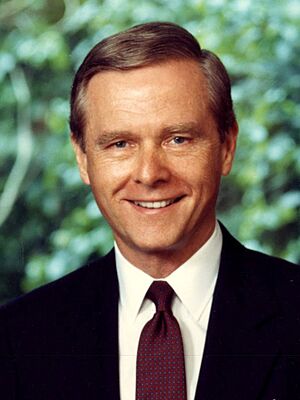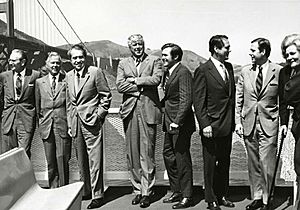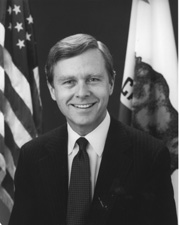Pete Wilson facts for kids
Quick facts for kids
Pete Wilson
|
|
|---|---|

Official portrait, 1991
|
|
| 36th Governor of California | |
| In office January 7, 1991 – January 4, 1999 |
|
| Lieutenant |
|
| Preceded by | George Deukmejian |
| Succeeded by | Gray Davis |
| United States Senator from California |
|
| In office January 3, 1983 – January 7, 1991 |
|
| Preceded by | S. I. Hayakawa |
| Succeeded by | John Seymour |
| 29th Mayor of San Diego | |
| In office December 6, 1971 – January 3, 1983 |
|
| Preceded by | Francis Earl Curran |
| Succeeded by | Roger Hedgecock |
| Member of the California State Assembly from the 76th district |
|
| In office January 2, 1967 – December 5, 1971 |
|
| Preceded by | Clair Burgener |
| Succeeded by | Bob Wilson |
| Personal details | |
| Born |
Peter Barton Wilson
August 23, 1933 Lake Forest, Illinois, U.S. |
| Political party | Republican |
| Spouses |
|
| Children | 2 |
| Education | |
| Signature | |
| Military service | |
| Branch | |
| Service years | 1955–1958 |
| Rank | First lieutenant |
| Unit | 1st Marine Division |
Peter Barton Wilson (born August 23, 1933) is an American lawyer and politician. He served as the governor of California from 1991 to 1999. Before becoming governor, Wilson was a U.S. senator for California from 1983 to 1991. He also served as the mayor of San Diego from 1971 to 1983.
Wilson was born in Lake Forest, Illinois. He joined the United States Marine Corps and later studied law at the UC Berkeley School of Law. After law school, he moved to San Diego and started his legal career. He became involved in politics, supporting Republican leaders like Richard Nixon. In 1966, Wilson was elected to the California State Assembly. He then became mayor of San Diego in 1971.
In 1982, Wilson was elected to the U.S. Senate. As a senator, he supported important laws like the Civil Liberties Act of 1988. This act provided payments to Japanese Americans who were unfairly held in camps during World War II. He also supported the Strategic Defense Initiative, a plan for missile defense.
Wilson became governor of California in 1991. During his time as governor, he signed a "three-strikes law" to make punishments tougher for repeat offenders. He also supported term limits for politicians. Wilson was a strong supporter of California Proposition 187. This law aimed to stop undocumented immigrants from using state social services. He was re-elected as governor in 1994. After two terms, he retired from public office.
Contents
Early Life and Education
Peter Barton Wilson was born on August 23, 1933, in Lake Forest, Illinois. This was during the Great Depression. His parents were James Boone Wilson and Margaret Wilson. His family later moved to St. Louis, Missouri.
Wilson attended private schools before going to Yale University in New Haven, Connecticut. At Yale, he studied English and received a scholarship from the United States Navy Reserve Officers' Training Corps (ROTC). After graduating from Yale, Wilson served three years in the United States Marine Corps as an infantry officer.
After his military service, Wilson earned a law degree from the University of California, Berkeley School of Law in 1962. In 1963, he moved to San Diego. He started his law practice there and became more involved in local politics. In 1966, at age 33, he won a seat in the California State Assembly. He was re-elected twice before becoming mayor of San Diego.
Mayor of San Diego

Pete Wilson served as the mayor of San Diego for three terms, from 1971 to 1983. He won each election by a large margin. As mayor, he made several changes to the city government. He reorganized planning and civil service groups. He also worked to improve downtown San Diego.
Wilson helped keep the Major League Baseball team, the San Diego Padres, in the city. He helped convince a local millionaire, Ray Kroc, to buy the team. In 1972, San Diego was supposed to host the 1972 Republican National Convention. However, the convention was moved to Miami. Wilson then started "America's Finest City Week," which became an annual event. This event led to San Diego's unofficial nickname.
United States Senator for California
In 1982, Pete Wilson won the election to become a U.S. Senator for California. He replaced Senator S. I. Hayakawa. Wilson ran against the current governor, Jerry Brown. Wilson was known for being careful with government spending. He supported Proposition 13, which limited property taxes.
During the election, Wilson focused on being tough on crime. He also had support from President Ronald Reagan, who campaigned for him. Wilson won the election, becoming a U.S. Senator.
Key Actions as Senator
As a senator, Wilson supported several important laws:
- He voted to create Martin Luther King Jr. Day as a national holiday in 1983.
- He supported the Civil Rights Restoration Act of 1987. This law helped protect civil rights.
- In 1984, he voted for a law that encouraged states to raise the minimum drinking age to 21.
- Wilson co-sponsored the Civil Liberties Act of 1988. This law provided payments to Japanese Americans who were unfairly held in internment camps during World War II.
- He was a member of the U.S. Senate Committee on Armed Services. He supported President Reagan's Strategic Defense Initiative, a system to defend against missiles.
- Wilson also worked to make sure the federal government paid states for new rules they had to follow. He was known as a "Watchdog of the Treasury" for his focus on careful spending.
In 1988, Wilson was re-elected to the Senate. He won with over 5 million votes, which was a record at the time for a Republican Senate candidate. In 1989, he decided to run for Governor of California. He resigned from the Senate in January 1991 when he became governor.
Governor of California
Pete Wilson won the election for Governor of California in 1990. He defeated Dianne Feinstein, who later became a U.S. Senator. Wilson became governor on January 7, 1991.
As governor, Wilson worked to improve California's economy. The state was facing a difficult economic period. He focused on careful budget management and attracting new businesses to create jobs.
Budget and Taxes
To help with the state's budget problems, Wilson increased some taxes and fees. This included raising the sales tax and car license fees. College tuition also increased during this time. He aimed to put the state on a more stable financial path.
Key Policies and Laws
- Child Support: In 1991, Wilson signed a law to make sure parents paid child support. This law aimed to help children and women in the state.
- Smoking Ban: In 1993, Wilson ordered a ban on smoking in most state buildings. He said this was to protect non-smoking employees and reduce cleaning costs.
- Education: Wilson worked on education reforms. He wanted statewide learning standards, smaller class sizes, and better teacher training.
- Energy Deregulation: Wilson supported changes that allowed energy companies to operate with fewer rules. This was meant to create more competition. However, some historians believe these changes later contributed to an energy crisis in California.
- "Three Strikes" Law: Wilson signed the "Three Strikes" law. This law gave much longer prison sentences (25 years to life) to people who committed serious crimes multiple times. He also supported bringing back capital punishment in California.
- Proposition 187: Wilson strongly supported California Proposition 187 (1994). This was a ballot measure in 1994 that aimed to stop undocumented immigrants from using public services like healthcare and education. Voters approved the law, but a federal court later found it unconstitutional, so it never went into effect. This law caused a lot of debate and is seen by some as a reason for changes in California's political landscape.
Wilson was re-elected as governor in 1994. He served two terms and could not run for a third due to term limit laws. When he left office, California had a large budget surplus. He was followed by Gray Davis as governor.
1996 Presidential Campaign
Pete Wilson ran for the Republican nomination for President in the 1996 United States presidential election. He announced his campaign in August 1995. However, he had recently had surgery on his vocal cords, which made it hard for him to speak clearly. He also struggled to raise enough money for his campaign. Wilson dropped out of the race in September 1995, before the main primary elections began.
Life After Politics
After leaving office in 1999, Pete Wilson continued to be involved in various activities. He worked for several businesses and joined different organizations. He is a visiting fellow at the Hoover Institution, a research center at Stanford University. He also serves on important government advisory committees related to foreign intelligence and defense policy.
In 2003, Wilson helped Arnold Schwarzenegger in his successful campaign to become governor of California. In 2007, a statue of Pete Wilson was placed on the San Diego Walk of Fame. He has received many awards for his public service, including the Patriot Award from the Congressional Medal of Honor Society.
Honors and Awards
Pete Wilson has received many awards and honors throughout his career:
- The Woodrow Wilson Awards for Distinguished Public Service.
- The Patriots Award by the Congressional Medal of Honor Society.
- An honorary degree from the San Diego State University of Professional Studies and Fine Arts.
- The Distinguished Alumnus Award from Boalt Hall, UC Berkeley.
- The Bernard E. Witkin Amicus Curiae Award from the Judicial Council of California.
- He was honored by the San Francisco Giants in 1998 by throwing out the first pitch at a home game.
- The Governor Pete Wilson Liberty Flagstaff was raised at The National WWII Museum in New Orleans in 2017.
- He received the Office of the Secretary of Defense Medal for Exceptional Public Service in 2018.
See also
 In Spanish: Pete Wilson para niños
In Spanish: Pete Wilson para niños
 | John T. Biggers |
 | Thomas Blackshear |
 | Mark Bradford |
 | Beverly Buchanan |



